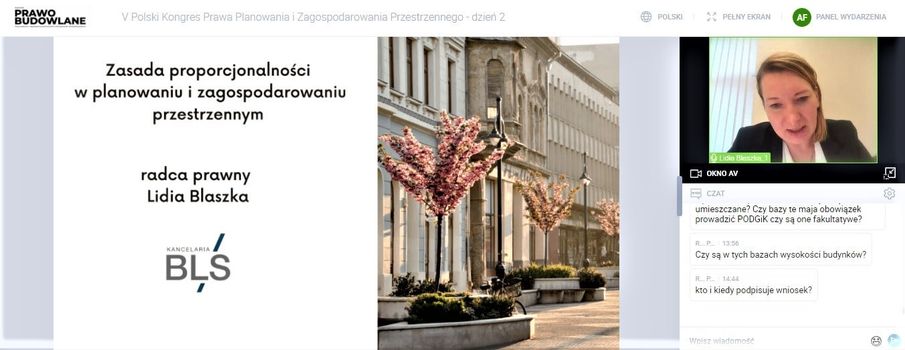I.
At the outset, it should be emphasised that local spatial development plans shape the way in which the ownership right to real estate is exercised. Planning acts directly or indirectly affect the rights of individual owners by specifying the way in which land covered by the plan is to be used. In this way, by their actions in the sphere of public law, authorised local government bodies affect the rights of private owners. It is of utmost importance to ensure that the interests of the entities affected by the spatial development plan can be protected.
In the Act on spatial planning and development, the legislator ensured the possibility of active participation of the public in the work on the adoption or amendment of local spatial development plans. Ensuring broad participation of residents in the planning procedures is to foster a proper diagnosis of the needs and expectations of the residents, and a balancing of the interests of various entities. Openness and transparency of planning procedures should also serve this purpose. Article 1(3) of the Act on spatial planning and development directly implies the obligation to balance the public interest with the private interest when determining the purpose or manner of development and use of land. It should be noted that none of them is superior. In case law it is even indicated that the public interest has not been given primacy over the interest of an individual (II OSK 791/19 – judgment of the Supreme Administrative Court (NSA) of 25-11-2020).
Therefore, property owners have the opportunity to influence planning acts in principle at each stage of their adoption. Protection of their interests requires active participation in the planning procedure. The discussion of particular rights vested in the interested persons requires a brief introduction to the planning procedure.
II.
The procedure begins with adoption of a resolution by the municipal council on commencing the preparation of a plan. A draft resolution is prepared by the mayor of a municipality. In order to determine the purpose of the land and specify the manner of its management and development, the municipality council first adopts a resolution on the accession to the preparation of a local spatial development plan. First, however, the head of commune, the mayor or president of the city performs analyses concerning, inter alia, the legitimacy of the plan’s accession to preparation, prepares geodetic materials for preparation of the plan and determines the necessary scope of the planning works. Following the adoption of the aforementioned resolution by the municipal council, the executive body of the municipality (the head of the commune, the mayor or the president of the city) is obliged to undertake activities facilitating public participation in the planning procedure. To this end, it announces in the local press, by way of a notice and in the Public Information Bulletin, as well as in the customary manner adopted in the given municipality, about the adoption of the resolution to proceed with the preparation of the plan, specifying the form, place and deadline for the submission of applications to the plan, which should not be shorter than 21 days from the date of the announcement. The authority does not send to private owners the information about the commencement of the local plan procedure, therefore it is necessary to follow the announcements referred to in the previous sentence. Proposals to the plan within the specified deadline may be submitted by practically anyone, the Act does not contain any subjective restrictions in this respect. Therefore, any owner may, in any form, submit to the executive body their proposals concerning the plan under procedure.
The head of the commune, mayor (city president) is obliged to consider all applications to the plan. The Act does not require the reviewing authority to specify the manner in which the applications are to be incorporated into the plan, nor to provide justification for the rejection of the applications. Each designation in the local spatial development plan of additional limitations on the exercise of the ownership right must be adequately justified in detail, professionally and credibly, therefore the lack of adequate justification for disregarding the applications or comments may constitute grounds for challenging the resolution adopting the local plan.
The next stage of the planning procedure is preparation of the draft local plan by the mayor. At the stage of preparing the draft, the authority considers the applications received earlier. The draft plan contains both text and graphics and therefore a town planner is involved in its preparation.
The opportunity to influence the content of the local plan is given to the local community in the course of a public discussion on the solutions adopted in the draft plan, which should take place during the public examination of the draft. The Act does not contain a definition or further specification of the rules of holding a “public discussion”. Based on the literal wording of the provision of Art. 17 item 9 of the Act, it may be assumed that:
1) the discussion is organised by the head of commune, mayor (city president);
2) it takes place during the public inspection of the draft;
3) the subject of the discussion are to a large extent the solutions adopted in the draft local plan;
4) there are no restrictions as to the entities that may participate in the discussion (thus, the discussion may be attended by both the municipality inhabitants and non-residents, representatives of the communities, legal entities through their representatives, and public administration bodies and organisational units without legal personality through their representatives).
Legal and natural persons as well as organisational units without legal personality are entitled to submit comments on the draft local plan within the deadline specified in the announcement on public disclosure of the draft local plan. The mayor is obliged to consider the comments and may take them into account by amending the draft plan. The decision of the head of commune, mayor (city president) not to consider the applications to the local plan, as well as the comments on the draft plan, are not subject to appeal to the administrative court. If the municipal council finds it necessary to amend the draft local plan submitted for adoption, including as a result of taking into account the comments on the draft plan, it is obliged to partially repeat the procedure of preparing the plan.
III.
Persons whose comments on the project have not been taken into account in the course of the planning procedure may use another instrument, i.e. they may challenge the resolution adopting the local plan. Following the public discussion and consideration of comments on the project, the council of the municipality adopts by way of resolution the local plan or amends it. Based on the provision of Article 101 of the Act on Municipal Self-Government, “Anyone whose legal interest or right has been violated by a resolution or order made by a municipal body in a matter of public administration may challenge the resolution or order to an administrative court.” Thus, the above provision gives a legitimacy to persons whose requests and comments were not taken into account at the stage of the plan procedure to challenge the resolution adopting the local plan. Importantly, it does not follow from the provisions of the Act on Planning and Spatial Development that the inactivity of the owner of the real property covered by the draft plan and his failure to submit comments on the draft plan deprives him of the possibility to demonstrate that his legal interest has been violated by the plan’s provisions and to demonstrate that the violation occurred in excess of the planning authority. In other words, anyone whose legal interest was violated by a resolution adopting a local plan may challenge such resolution, regardless of whether they participated in the earlier stages of adopting the plan by submitting motions to the plan or by filing comments.
A condition for challenging a resolution on adopting or amending a local spatial development plan is that it violates an individual interest of a citizen. The judicature indicates that a complaint may only be filled by an entity that demonstrates its ownership right. Thus, in order to fill a complaint effectively, it is necessary for a party to demonstrate that as a result of adoption of a contested resolution, its specific legal interest or entitlement has been violated by limitation or deprivation of rights arising from its right. In other words, it is necessary to demonstrate that as a result of the adoption of the appealed resolution, a specific and current individual interest has been violated and to indicate the violation by a municipal body of a specific provision of substantive law, having a negative impact on the legal situation of the complainant.
IV.
Irrespective of challenging the resolution adopting the local spatial development plan and the possibility to make motions and comments in the course of the planning procedure, another legal remedy available to the owner whose interest has been violated by the adoption of or changes to the plan is the possibility to pursue claims for compensation for damage resulting from the adoption or changes to the local plan. In order to assert such claims it is necessary to meet strict conditions described below. Pursuing claims does not constitute a stage of the planning procedure, however their emergence is connected with the solutions adopted in the plan, and it is up to the interested party to decide whether to pursue such claims.
The issue of the financial effects of adopting or amending the local plan is regulated by Art. 36 par. 1 of the Act, under which if, in connection with the adoption of a local plan or its amendment, it has become impossible or substantially restricted for the owner or the perpetual usufructuary of the property to use the property or a part thereof in the manner or for its intended purpose, the owner or the perpetual usufructuary of the property may demand from the municipality
1) compensation for the actual damage incurred, or
2) to purchase the real estate or a part thereof.
The above claims may also be executed by way of the municipality offering the owner or perpetual usufructuary a substitute real estate (Article 36, paragraph 2).
Accordingly, if, in connection with the adoption of a local master plan or its amendment, it has become impossible or substantially restricted for the owner (perpetual usufructuary) to use the real property or a part thereof in the manner or for the purposes previously intended, the owner (perpetual usufructuary) is entitled to file a claim against the municipality for compensation or purchase of the real property. The municipality is obliged to execute the claim indicated by the entitled person. If he chooses compensation, he may effectively claim it for the damage he actually suffered (damnum emergens) and not for lost profits (lucrum cessans).
Claims for lack of possibility (limitation) of using a real estate in the same way as before, due to the adoption of a local plan or its change, are time-barred pursuant to the general rules under the Civil Code (see Article 118 of the Civil Code).
The second situation in which the owner has a claim against the municipality is when, following the adoption of the local plan or its change, the use of the property or its part in the existing manner (consistent with the existing purpose) is possible, but the value of the property is diminished. If, in connection with the enactment of the local plan or its amendment, the value of the real property is diminished and at the same time the owner (perpetual usufructuary) has not availed himself of the possibilities referred to in Article 36 (1) and (2) of the Act (i.e. it is possible to use the real property in the existing manner), the owner (perpetual usufructuary) may request from the municipality to pay compensation equal to the diminished value of the real property. Such compensation becomes payable as of the date of sale of the real property (date of conclusion of the sales agreement). Therefore, if the value of the real property is diminished as a result of enactment of the plan or plan amendment, but the owner (perpetual usufructor) does not sell the real property, the claim in question does not arise at all.
In such cases it is essential to obtain an opinion of a real estate valuation expert who will assess whether and in what amount compensation is due.
The following articles will be devoted to detailed discussion of, in turn:
1. principles, form and deadline for submitting applications and comments at the stage of plan procedure;
2. the premises and procedure of appealing against resolutions adopting or amending local plans;
3. pursuing claims for damages by owners related to change of the designation of real property.









